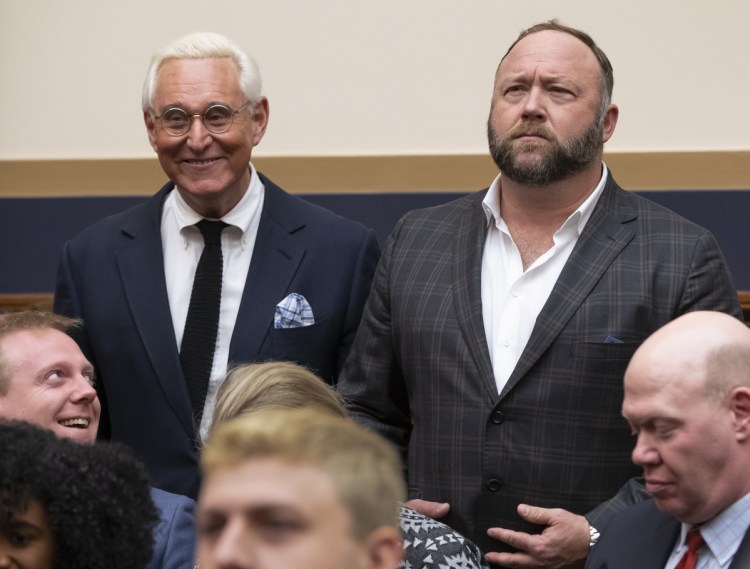Is Roger Stone telling the truth? That’s among the biggest questions at the heart of special counsel Robert Mueller’s probe into Russian interference in the 2016 presidential election. Despite bragging at the time about being in contact with Julian Assange, Stone has insisted he had no warning that WikiLeaks would be releasing hacked Democratic National Committee emails and said he didn’t relay that information to his longtime confidante Donald Trump.
Mueller has yet to tip his hand on whether he believes Stone, although he’s devoted significant resources to the question.
On Monday, though, Stone admitted that he used his platform on Infowars, the far-right conspiracy website founded by Alex Jones, to spread false information in another case.
To settle a lawsuit seeking $100 million in damages from Guo Wengui, an exiled Chinese businessman, Stone admitted that he “failed to do proper research” before accusing Guo of violating U.S. election law by donating money to Hillary Clinton’s campaign. Stone also falsely accused Guo, who is also known as Miles Kwok, of funding a presidential run by Stephen Bannon and being convicted of financial crimes.
In a statement sent to The Washington Post, Stone blamed the falsehoods on Sam Nunberg, a former Trump aide who has now testified before a special counsel’s grand jury.
“I made the error of relying on the representations of Sam Nunberg in my report on this matter, and for that I apologized,” Stone said.
Nunberg, who didn’t respond to messages from The Post, declined to comment on the claims to The Wall Street Journal.
Stone’s admission is sure to give fuel to critics who accuse the political trickster of being less than forthright about his role in the DNC email dump, which has since been linked by U.S. intelligence agencies to Russian hackers seeking to swing the election for Trump. Guo sued Stone in federal court in Florida in March over the false claims on Infowars. The businessman fled China in 2014 and has since become a loud critic of the Chinese government, which has tried to have him arrested and returned to Beijing.
Stone accused him of breaking U.S. election law, which forbids foreign nationals from donating to political campaigns. But in Stone’s new settlement, he says “all of these statements are not true,” and he says Nunberg fed him false information that came from Bruno Wu, a Chinese-American businessman whom Guo has accused of being a Chinese spy. Wu is suing Guo for defamation over those assertions, The Wall Street Journal reported. A spokesperson for Wu’s company didn’t immediately respond to a message from The Post about Stone’s allegations; Wu declined to comment to the Journal.
In addition to admitting in court documents that he spread falsehoods, Stone said he would share his statement via Facebook and Instagram and would take out ads in The Washington Post, New York Times and Wall Street Journal.
Send questions/comments to the editors.



Success. Please wait for the page to reload. If the page does not reload within 5 seconds, please refresh the page.
Enter your email and password to access comments.
Hi, to comment on stories you must . This profile is in addition to your subscription and website login.
Already have a commenting profile? .
Invalid username/password.
Please check your email to confirm and complete your registration.
Only subscribers are eligible to post comments. Please subscribe or login first for digital access. Here’s why.
Use the form below to reset your password. When you've submitted your account email, we will send an email with a reset code.